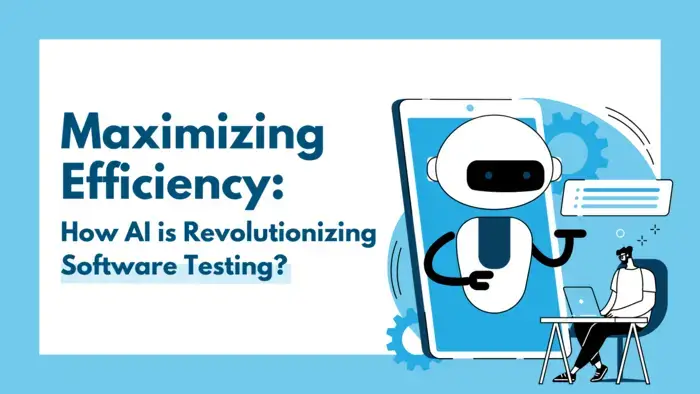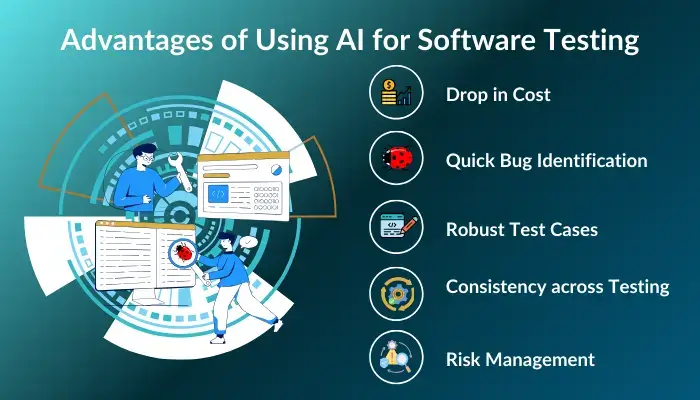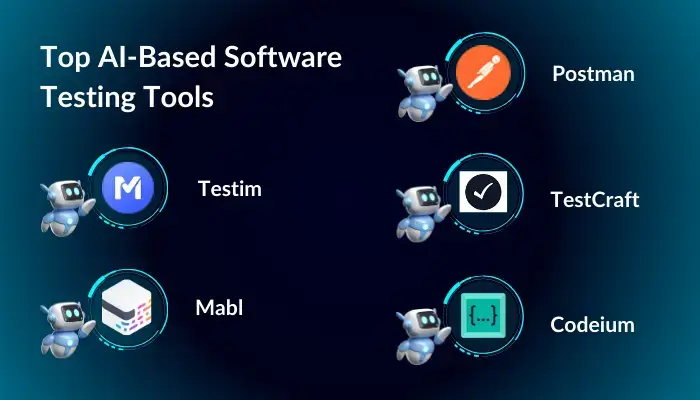AI Software Testing in 2025: Your Expert Guide
From 1947 to 2020, human civilization witnessed tremendous changes in terms of technology due to which this period is widely recognized as the 'Information Age'. But, 2020 is long gone, and now, what is coming? The Post Information Age, also known as the AI Age is conquering the technological world. Many industries now focus on one task, to integrate AI into their workflows.
Software testing is among those areas where AI has left its herculean impact. With highly functional AI tools, and the right practices, software testers have started to leverage AI testing automation for a faster software testing life cycle (STLC). However, that's not all as AI has much to deliver to software testing. What we're seeing with AI in software QA is a fundamental shift in how testing is approached.
What is AI Software Testing?
Software testing means checking a program to find bugs or other problems. When done by hand, this process can take months—especially with large systems. AI testing cuts down the time it takes by automating much of the work. It also helps testers focus on what matters most.

Instead of following the old manual approach, AI testing automation tools can now handle complex tasks, freeing testers to design better test cases.
The Benefits of AI-Powered Software Testing Solutions
Let's explore how AI is improving software testing services efficiency through these key benefits.
- Lower Costs: As manual testing is time-consuming, it requires more testing hours, resulting in higher expenses. By minimizing the manual efforts of the testers, they spend less time in testing, leading to cost savings. Apart from that, AI provides additional savings by enhancing efficiency in resource utilization.
- Faster Bug Detection: Identifying bugs quickly allows the development teams to fix the issues in minimal time. With quick bug identification and fixing, the software can be delivered to the end users quickly. AI software testing can detect bugs faster than manual efforts, leading to quicker resolution and delivery.
- Robust Test Cases: Undeniably, creating test cases can be monotonous due to which testers may sometimes have limited diversity. AI can eradicate this issue as it can generate a broad range of unique test cases, covering all aspects of the software. With unique test cases, AI can help testers identify even minor bugs that can affect the user experience.
- More Reliable Testing Results: When the tests are executed manually, there can be a possibility of inconsistencies that can cause unreliable test outcomes. This issue is resolved through AI test automation tools as they can not only repeat the test execution but can do so consistently, resulting in more accurate and reliable test results.
- Better Risk Management:AI can simulate real-world use cases and spot risks early. That means fewer surprises after release.

Are there Limitations to AI Software Testing?
AI tools are powerful, but they’re not perfect.Leveraging the benefits of AI in software testing also brings certain limitations. Here are some limitations that will allow you to poptimize the software testing automation.
- Lack of Human Judgment: AI doesn’t understand context like people do. It follows patterns in data, which means it might miss unusual but important issues.
- Hard to Keep Up with Fast-Changing Systems: As software evolves, AI models need to be updated constantly. This can take time and effort.
- Non-Functional Testing Is Still a Challenge: AI is good at checking if something works. It’s not great at judging user experience, security, or compliance—things that often need a human touch.
- Dependence on Quality of Training Data: AI Software Testing only works well if it’s trained on quality data. Bad data leads to bad results.
- Integration Isn’t Always Easy: Integrating new AI testing automation into existing systems can be complicated and may require custom setup.
How AI Testing Automation Transforms Quality Assurance?
AI in software QA is already improving how teams test software. Here are some key use cases:
1. Test Case Generation:
AI can read requirements or look at code and automatically build test cases—saving testers hours of work.
2. Test Case Optimization:
MIt finds and removes redundant tests, prioritizes important ones, and runs them in the most efficient order.
3. Defect Prediction:
By analyzing past bugs and code patterns, AI can point to likely problem areas before testing even starts.
4. Root Cause Analysis:
AI helps track down where a bug started, so developers can fix it faster.
What are the Top AI-Based Software Testing Tools?
These are some of the most widely used AI Software Testing Tools.
- Testim: Uses machine learning to reduce flaky tests and now includes visual validation that spots UI bugs with near-human accuracy.
- Mabl:Adapts tests as your UI changes. New features let you describe tests in plain English, and it builds them for you.
- Postman: Postman is widely used for API testing and development. The tool supports automated testing by allowing users to create and run tests using scripts. Furthermore, Postman's AI-driven features include automated generation of tests based on API schemas and detailed reporting.
- Applitools: Specializes in visual testing. Its platform now detects both visual and functional bugs, cutting testing time dramatically.
- TestSigma:Reads user stories and creates test scripts automatically. It works well across web, mobile, and APIs.
- Kobiton:Uses real user data to create intelligent test scenarios for mobile apps. It now offers quick access to many devices through the cloud.
- TestCraft: A codeless test automation platform, TestCraft uses AI to enhance test creation and maintenance. With this tool, testers can create automated tests using a visual interface, making it accessible to non-technical users. TestCraft's AI algorithms automatically update tests in response to app changes, ensuring tests remain effective over time.
- Codeium: Codeium is an AI-powered coding assistant that aids with writing and optimizing test scripts. This tool can be integrated with renowned integrated development environments (IDE) and supports various programming languages. Moreover, Codeium offers intelligent code suggestions and automates repetitive coding tasks, enabling developers to focus on more complex aspects of testing and development.
These AI test automation tools provide capabilities that traditional testing frameworks cannot match.

The Future of AI in Software Testing: What Lies Ahead
In recent years, AI has penetrated software testing rigorously. However, it is still not as perfect as anticipated. On the other hand, the future of AI in software testing seems extremely bright for this technology, and new changes are expected in AI to support software testing. With that in mind, the following are some of the things expected from AI in the coming time.
1. Better Accessibility Testing:
New tools simulate how people with disabilities use your app. Microsoft used this to improve accessibility by 43% and cut manual reviews by 65%.
2. Smoother Integration:
Currently, integrating AI systems with existing processes within the development is still a challenge with AI. Compared to the past, it has become significantly easier to integrate them with the existing process. By analyzing the past, it can be predicted that integrating AI and NLP-based testing into the existing systems can become significantly smoother.
3. FPredictive Quality:
AI is starting to spot problem areas before testing even begins. It looks at past bugs, complex code, and how teams work to flag risky sections of code.
4. Private LLMs for Secure Testing:
As public tools like ChatGPT raise privacy concerns, more companies are turning to local AI models. IDC says nearly half of finance and healthcare firms now use private LLMs for testing secure applications.
5. Testing Across Devices and Platforms:
AI can now test your app across web, mobile, voice, AR/VR, and IoT devices—all at once. By 2026, 60% of large companies are expected to use this.
6.Fully Autonomous Testing:
Some companies are testing systems that design, run, and even fix test failures without human help. Deloitte says 35% of large companies are already piloting this.
7.Synthetic Test Data:
AI can now generate fake data that acts like real user data—without the privacy risks. This saves time and meets compliance rules.
Conclusion
AI was built to help people work faster and smarter—and that’s exactly what it’s doing in software testing. It’s helping teams cut costs, reduce bugs, and release updates faster.
A 2024 Capgemini study showed companies using AI in testing saw:
- 37% lower costs.
- 45% faster releases.
- 29% more bugs caught.
Still, AI can’t replace human testers. The best approach is a mix—let AI handle the heavy lifting while people focus on areas where judgment and creativity matter.
Forward-thinking teams are shifting from "quality assurance" to "quality engineering." They’re using AI not just during testing but throughout the development process—from writing code to monitoring live apps.
As the 2025 World Quality Report put it:"The most successful testing strategies combine the creativity and intuition of human testers with the speed and consistency of AI."
Frequently Asked Questions About AI Software Testing
How is AI testing different from traditional testing?
AHow does AI improve testing efficiency?
What are the best AI testing tools in 2025?
How is machine learning changing QA?
How should companies get started with AI testing?
What kind of ROI can companies expect from AI testing?
Share This Article:







